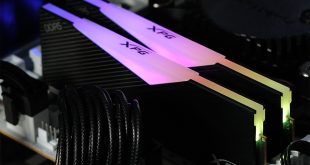The Radeon VII marks AMD's return to the high-end gaming market, with the graphics card priced at $699/£649 and aimed squarely at Nvidia's RTX 2080 when it comes to real-world gaming performance.
If we get right to the actual gaming performance of this card, it is generally quite competitive with the RTX 2080 – it edges ahead in some titles, before falling back in others. On average, though, we saw the Radeon VII come in at 4% slower than the RTX 2080 at 1440p resolution, with the gap shrinking to 3% at 4K resolution. This represents a leap forward of about 23-27% compared to last generation's Vega 64.
This means we are certainly getting a competent gaming graphics card, with 1440p frame rates typically coming in the 85-110FPS region, which would compliment a high refresh-rate monitor very nicely. Radeon VII is also capable of 4K gaming, though you will have to deal with lower frame rates, typically in the ballpark of 45-60FPS depending on the game.
Gaming performance aside, AMD's reference card does have some troubles, however. Chief among these is the very high level of noise the card produces under load – I measured total noise coming in at just over 55dB, meaning it is not quite as loud as Vega 64, but it comes very close. For a triple-fan card, this is certainly disappointing – the noise is definitely unpleasant and compared to Nvidia's own Founders Edition designs, it represents a fairly significant blow to Radeon VII's appeal.
Power consumption is again high, second only to Vega 64 which draws about 40W more under load. With RTX 2080 3-4% faster in games, while also drawing about 60W less power at the wall, Nvidia is clearly still winning the power efficiency argument – and quite convincingly, too. Even RTX 2080 Ti draws less power than Radeon VII.
I had a very difficult time trying to overclock the Radeon VII, too. With MSI Afterburner not yet updated to support AMD's latest flagship, I had to rely on Wattman by manually tweaking the frequency/voltage curve to overclock the Radeon VII. No matter what I tried, I couldn't get any extra performance from the card – and in the end I had to settle with using the ‘auto overclock' function which added a paltry 30MHz to the core while taking noise levels over 63dB. I will revisit overclocking in the future, and it is possible my sample is just a poor overclocker, but as it stands overclocking Radeon VII seems to be a fruitless task.
So taken as whole, AMD's Radeon VII certainly offers decent gaming performance, besting the RTX 2080 in some titles though it is overall slightly slower on average. The card does need work, though, and based on what we know at the time of publication, there will not be any custom cards at launch from the likes of Sapphire, ASUS or Gigabyte. We're not yet sure if any custom designs will appear in the coming weeks and months, but if you're looking for a Radeon VII now then you will have to make do with the less-than-ideal reference design.
Even then, there is no denying pricing is the biggest stumbling block to recommending a Radeon VII. We had initially been told that UK pricing will be £689 at launch, but this morning Overclockers UK has confirmed to us that it will have stock available at £649.99. That still puts Radeon VII right into entry-level RTX 2080 territory – as we can see HERE, at the time of writing there are some RTX 2080s at or around – even below – the £650 price point.
That makes it very hard for the Radeon VII to make a compelling case for itself against the RTX 2080. It's overall slightly slower, more power hungry and also louder than any RTX 2080 I have tested, while my sample suggests there is effectively no overclocking headroom either.
Matters also aren't helped by the fact that Nvidia GPUs now support FreeSync technology. Previously, you could've easily made the argument that buying a Radeon VII to pair with a 1440p/144Hz FreeSync monitor makes sense from a value perspective, as you could often pay £200+ more for the equivalent G-Sync display – so even if the Radeon VII is a few frames slower than an RTX 2080, it is still very capable for high refresh-rate 1440p gaming, and you would have saved a fair amount of cash versus going with RTX 2080 and a G-Sync panel.
Now, however, that is one less argument in favour of the Radeon VII – so it very much comes down to how well it performs for the money. To be clear, its gaming performance is definitely good – it pushes the RTX 2080 close, so it's not like it is miles behind. But we come back to pricing – it just becomes very hard to justify a Radeon VII over RTX 2080 when they appear to be effectively price matched, yet RTX 2080 is the overall faster card, with lower power draw and a decent amount of overclocking headroom to boot.
One last potential argument in favour of the Radeon VII is its memory allocation – you could argue that 16GB of HBM2 memory may benefit the Radeon VII when it comes to 4K gaming as more VRAM-hungry games comes out over the next year or two. Even if we take that as a given, however, based on our current testing it seems to me that the Radeon VII will run out of GPU horsepower before all 16GB of its VRAM is actually utilised – and we don't even know if or when a game would fully utilise that much video memory.
So my conclusion is this – if you are a gamer looking to spend £650-700 on a new graphics card, currently the RTX 2080 is your best option. AMD has shown it can compete and push the RTX 2080 close when it comes to raw performance – which is almost certainly all it was hoping to achieve anyway – but from a consumer standpoint, I struggle to see why you would buy Radeon VII instead of RTX 2080, as the latter card is just a better all-round package.
If it were priced at £550, even £600, you could definitely make a case to gamers who aren't interested in Nvidia's RTX features – in that scenario, you'd be getting similar performance to an RTX 2080 but saving £50+ as well. As things stand, however, we can say AMD has come close, but the Radeon VII is just not able to topple the RTX 2080 in this market segment.
You can buy the Radeon VII from Overclockers UK HERE. As we mentioned, all the cards on sale at launch are reference designs – AMD has said partners are free to manufacturer modified versions, but we have not yet seen any or had confirmation that board partners are indeed manufacturing custom cards.
Pros
- Well suited to a high refresh-rate 1440p monitor.
- Faster than RTX 2080 in some titles.
- Attractive and relatively compact design.
- Thermal performance is good – even if it comes at the cost of noise levels.
- 16GB VRAM is future-proof.
Cons
- On average 3-4% slower than RTX 2080.
- Draws more power than RTX 2080 Ti.
- Next to no overclocking headroom with my sample.
- Very loud.
- Expected to be priced similarly to entry-level RTX 2080 models – which offer a better all-round package.
- Custom card situation is very unclear.
KitGuru says: From a raw gaming performance standpoint, the Radeon VII certainly comes close to the RTX 2080. When we factor in everything else – including noise levels, power draw and overclocking headroom – at the expected price of £649, Radeon VII really struggles to justify itself over RTX 2080 cards available for the same money.
 KitGuru KitGuru.net – Tech News | Hardware News | Hardware Reviews | IOS | Mobile | Gaming | Graphics Cards
KitGuru KitGuru.net – Tech News | Hardware News | Hardware Reviews | IOS | Mobile | Gaming | Graphics Cards





